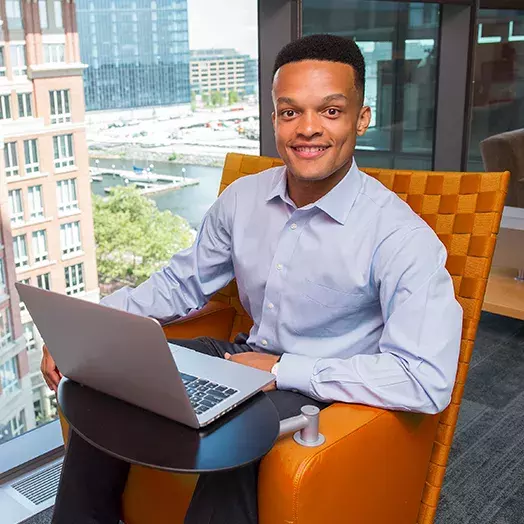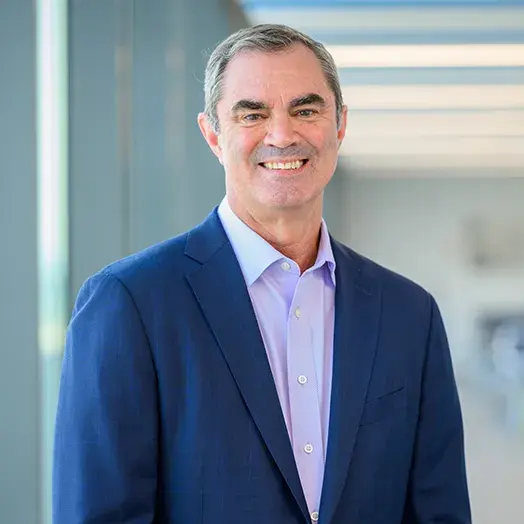Johns Hopkins Carey Business School students reflect on their experiences after a year of virtual student life and learning.

Student organizations pivot to prove virtual learning is a positive
One full calendar year has passed with students at Carey Business School being entirely in virtual programs.
And the student experience has proved to be more robust than ever. Student organizations and their leaders have pivoted in ways to connect from all over the world.
While on-site classes may have taken a pause, the online community at Carey has sustained its highly inclusive learning experience. Carey Business School is not new to the virtual world (Carey offered fully online degrees before the pandemic), and students in flexible and fully online programs say they have felt even more engaged, accepted, and valued. Meetings shifted to online, enabling students in different areas of the world to commit to the same schedules as those in full-time, traditionally in-person programs.
Jasmine Lu (MS, Business Analytics and Risk Management ’21) says the virtual learning environment helped students feel more involved. “We had workshops where students were able to connect online and not feel the pressure of having ‘all eyes on you’ when presenting,” Lu said.
Lu is based in California. Having never stepped on the Baltimore campus, she jumped into a leadership role in the Business Analytics and Risk Management student organization. She is one of the many online students who have had the opportunity to not only be involved in an organization but also take charge as a student leader.
Virtual learning has opened new doors for students and changed the way they approach their work.
Rhianna Taniguchi (MBA ’23) appreciates the ability to adjust hours and work around other students’ schedules.
Taniguchi is embracing the virtual experience. She has been involved in several extracurricular activities at Carey Business School, including the Women’s Coaching Group. As part of this group, Taniguchi helped host conversations on how women can bring their full selves to the workplace amid the COVID-19 pandemic.
“Being fully on Zoom, people were still so authentic, present, and vulnerable. We had intimate conversations that brought an otherwise reserved and disparate group closer,” Taniguchi said.
Taniguchi also participated in the Turner MBA Impact Investing Network & Training (MIINT) program. Her team developed a foundation in impact investing that required students to source and conduct due diligence on early-stage impact investments.
“Our team was very diverse in geography. Every member was located in a different city. We embraced the opportunity to learn together, and we used our weekly meetings as an opportunity to share resources and build relationships, which was really important because we couldn’t do that in-person,” she said.
In times of such uncertainty, students are more empathetic toward their peers.
In talks with Lu and Taniguchi, both women recognized that the virtual environment has generated more support and empathy among the students.
“A lot of classmates would say ‘sorry for the mess’ or ‘sorry for the noise,’ but it really wasn’t disruptive. If anything, I think it helped us develop empathy for each other and reminded us that everyone has a life outside the classroom,” Taniguchi said.
Students who were struggling with the daily commute to make it on time for classes or team meetings were now able to attend in the comfort of their own homes.
“I love the remote synchronous classes. I was hesitant because I’d done online classes before and wasn’t a fan. But the professors at Carey were so dedicated to being present, engaging, and accommodating. They brought energy to each class and made an incredible effort to connect with the students,” Taniguchi said.
“Within Carey, everyone was so supportive and willing to connect if there were questions. The virtual world is truly a system that encourages people to give more feedback and reports on what is working and what isn’t, to re-evaluate moving forward,” Lu said.
When hit with uncertainty, student leaders like Lu were able to connect with their professors to receive feedback. And those students received more than the typical response.
“For me, one of the greatest parts of the year was that faculty and staff really did listen to what we were asking for. Our advisors actually created a new platform for scheduling within student organizations,” Lu said.
The new scheduling system allows for student leaders to log-on and check specific times and dates. Online platforms streamline the process to mitigate the back and forth of e-mail.
Equalizing power for all
In past years, students in an online setting may have felt further removed, being unable to attend in-person meetings or engagements because they were in other parts of the world. This year, students were on the same playing field.
Virtual learning has helped equalize access for all. Michael Pham (MBA ’23) said the virtual world allowed him to finally be seen and heard for what he brings to the classroom, rather than being judged by his disability.
Online meetings enabled groups to build authentic relationships with each other while relating in personal ways.
“The virtual environment at Carey was so inclusive and accessible. It made it easy for me to take my dog out, then jump on the computer and be with classmates who were also juggling their work and home responsibilities,” Taniguchi said.
Pursuing new opportunities
Student organizations have explored new opportunities, creating a new paradigm for higher education at Carey.
Student leaders were able to reach out to individuals from across the world to speak at conferences or compete in case competitions.
“These opportunities never would have come to life if our student organizations were still in-person,” Lu said.
Over 50 case competitions, conferences, and events were conducted throughout the virtual year. Student leaders proved their ability to flex while finding innovative ways to make their events move to a virtual setting.
The Danaher Case Competition attracted a record 65 teams from various nations. The KeyBank OSU Case Competition, where Taniguchi and her team won first place, was completed fully online.
“We utilized a new design tool called MIRO to collaborate during the competition. It forced us to learn new skills and surprisingly enabled us to do things we wouldn’t have done in-person,” Taniguchi said.
Other student organizations like the Africa Business Club and Healthcare Business Association hosted large-scale conferences, both virtual. Each conference was planned and implemented by the student leaders.
The Africa Business Conference had over 620 registrants, with many of the panel speakers residing in Africa. The conference was deemed so successful that a business school in Africa is now considered a sister-student organization to Carey’s Africa Business Club.
The Business Analytics and Risk Management student organization also successfully adjusted their roster of events to the uncertainties of the lockdown.
“We had five events this past year, and all were done online. In [the Business Analytics and Risk Management organization], we have students from around the world, so I was thrilled to see all our board members able to come together to plan our events and attend them all, which has not happened in the past,” Lu said.
Working collaboratively to reach out via LinkedIn or through the alumni network, student leaders found that external partners and leaders in different countries were more than happy to engage in their events.
A moment to step away
As with any significant change, virtual learning offered some challenges as well. Presenting yourself in front of a computer screen every day for multiple hours can be draining.
“There were certainly more meetings than normal. But finding a balance and preparing ahead of time to make yourself comfortable helped a lot,” Lu said.
Taniguchi’s biggest tip for dealing with the demands? Take care of yourself mentally, physically, and emotionally. “Pay attention to what your body tells you, especially when you’re sitting in a chair all day. And take the time to know that you are able to step away from your computer for a bit.”


